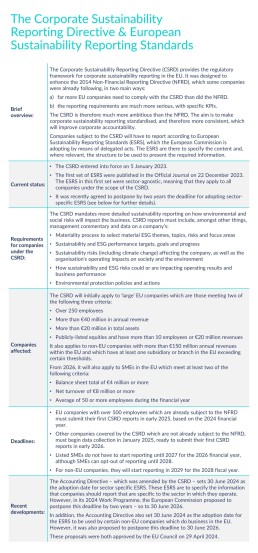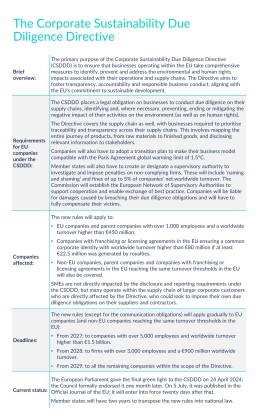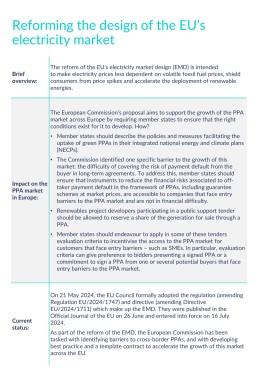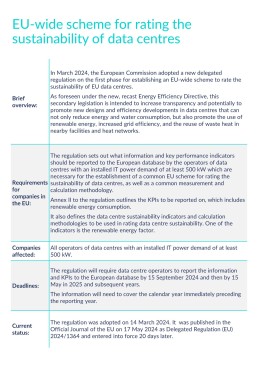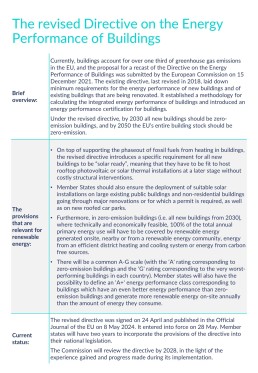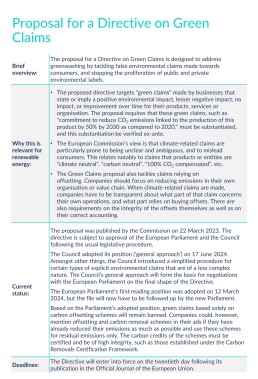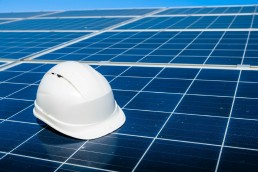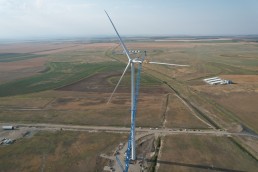In the last article in this series, we took a deep-dive into the telecommunications industry, a sector which, according to industry estimates, accounts for 1-2% of all energy consumed globally – and which is amongst the fastest-growing for renewable energy power purchase agreements (PPAs).
In that piece, we identified three of the most important factors driving the interest from telecoms companies in PPAs – to summarise:
- Telecoms operators use a lot of electricity, and decisions over renewable power cannot wait if the sector is to meet its sustainability commitments
- Renewable energy buying is being driven by the search for cost savings
- European regulations are driving change
This time, we are going to consider this final point in more detail, but in a broader context: which regulations, directives and other EU initiatives are – or will be – the most important in encouraging European companies across all industry sectors to switch to buying more clean power?
A complex landscape
When it comes to the decarbonisation agenda, the regulatory context has been moving rapidly since the European Green Deal was first presented in December 2019 – and particularly since the ‘Fit for 55’ package was proposed by the European Commission in 2021.
Our aim here is not to summarise all of the various pieces of legislation that are designed to accelerate the energy transition and reduce emissions. Instead, we will narrow the focus down – we will:
- concentrate on those regulations, directives and other EU initiatives which are specifically designed to encourage European companies to procure more clean power.
- consider legislative proposals which have not yet been approved, and legislation which has been approved but is not yet fully in force – so where some of the obligations on companies are still pending (i.e. we will not focus on directives and regulations which have already been implemented in full and where the obligations on companies are already in force).
If you apply those two ‘filters’, there are six pieces of legislation which will be the most important in encouraging companies to switch to renewable energy:
- The Corporate Sustainability Reporting Directive & the European Sustainability Reporting Standards
Sustainability reporting sits at the heart of the EU’s green strategy, and the Corporate Sustainability Reporting Directive (CSRD), which entered into force in January 2023, provides the regulatory framework for it. Companies subject to the CSRD will have to report according to European Sustainability Reporting Standards (ESRS), which the European Commission is adopting by means of delegated acts. The first set of ESRS were published in December 2023.
Here is a more detailed overview of the CSRD and ESRS:
- The Corporate Sustainability Due Diligence Directive
The Corporate Sustainability Due Diligence Directive (CSDDD) sets obligations for large companies regarding actual and potential adverse impacts on human rights and the environment, with respect to their own operations, those of their subsidiaries, and those carried out by their business partners:
- Reforming the design of the EU’s electricity market
In March 2023, the European Commission proposed a reform of the EU electricity market, with the aim of reducing price volatility for consumers and creating favourable conditions for investors in renewable energy. The reform includes two legislative proposals – one on electricity market design and the other on protection against wholesale energy market manipulation. One of the objectives is to support the use of more long-term instruments such as PPAs and contracts for difference (CfDs):
- EU-wide scheme for rating the sustainability of data centres
We referenced this in the previous article in this series, but on 14 March 2024, the European Commission adopted a new delegated regulation on the first phase for establishing an EU-wide scheme to rate the sustainability of EU data centres. With data centres estimated to account for close to 3% of EU electricity demand – a figure which is likely to significantly increase in the coming years – the scheme is intended to increase efficiency developments and to promote the use of renewable energy:
- The revised Directive on the Energy Performance of Buildings
The revised Directive on the Energy Performance of Buildings entered into force on 28 May 2024. It is relevant for companies’ use of renewable energy because it introduces a specific requirement for all new buildings to be “solar ready”, and will ensure a much wider roll-out of solar installations on buildings and renewable energy capacity on-site:
- Proposal for a Directive on Green Claims
The proposal for a Directive on Green Claims is designed to address greenwashing. It is relevant to renewable energy because it tackles claims which rely on offsetting, emphasising the need for companies to focus on reducing emissions in their own organisation and value chain:
The regulatory landscape is making the transition to renewable energy a more and more urgent priority for companies across the EU
Since the European Parliament elections last month, there has been much talk about the ‘shift to the right’, with populist parties gaining seats across the EU – and what it might mean for the future of the Green Deal.
However, as will be clear from the overview above, much of the regulatory environment which is designed to encourage European companies to procure renewable energy is already in place – and it will not be unpicked by the new Parliament. The obligations on companies operating in the EU are coming, and as the deadlines approach, so the need to switch to clean power will only become more urgent.
What’s coming up next time?
Next time, we will be taking another sector deep-dive, this time into the industry which is leading the way when it comes to the amount of capacity that has been contracted through green PPAs: information & communications technology (ICT)…
You might also like
15 October 2025
VIFOR Wind Farm Progress Update
The construction of Rezolv’s VIFOR wind farm in Romania is moving forward at pace.
14 October 2025
Central & Southeastern Europe’s renewables revolution: which countries are leading the race to decarbonise?
Earlier in this series, at the end of Q1 2024, we considered 2030 emissions targets and provided a ‘status update’ on the progress the countries in Central & Southeastern Europe (CEE) had made in 2023.
6 October 2025
Rezolv offers 100 free training places in renewable energy, in partnership with RenewAcad
Rezolv Energy, one of the leading renewable energy producers in Central and Southeastern Europe, is offering 100 free training places in Buzău County, Romania, to help local people gain the skills needed for tomorrow’s clean energy jobs.
3 October 2025
Rezolv Energy receives EU grant for battery energy storage project in Bulgaria
Rezolv Energy has secured a grant from the European Union under the NextGenerationEU programme for the deployment of a Battery Energy Storage System (BESS) at the St. George solar power plant in Bulgaria.
14 August 2025
Rezolv Energy a major winner in Romania’s second contracts for difference (CfD) auction
Rezolv Energy, backed by growth market sustainable infrastructure investor Actis, has been awarded three contracts for difference (CfDs) by the Romanian Ministry of Energy in the country’s second CfD auction.
31 July 2025
Rezolv Energy selects partners for Phase 2 of the VIFOR wind farm in Romania
Rezolv Energy, backed by growth market sustainable infrastructure investor Actis, has selected its key partners for Phase 2 of the VIFOR Wind Farm in Buzău County, Romania.
22 July 2025
Rezolv Energy signs incremental €331 million finance facilities to bring its VIFOR wind farm in Romania to full capacity
Actis-backed Rezolv Energy, through its project subsidiary First Look Solutions S.R.L., has signed incremental project finance facilities of up to €331 million to support construction of the 269MW second phase of its VIFOR wind farm in Buzău County, Romania. Phase 2 will take the project to its full 461MW capacity.
1 July 2025
Rezolv Energy and SCION Launch Nature and CleanTech Accelerator for Early-Stage Ventures in Bulgaria and Romania
Rezolv Energy and SCION have announced the launch of the SCION Accelerator, a 10-week programme to support early-stage teams working at the intersection of ecology, science and scalable technology in Bulgaria and Romania.
19 February 2025
Why has the retail sector moved into the big leagues when it comes to renewable energy procurement?
In the last article in this series, we undertook a deep-dive into the ICT industry and why it – and the growth of data centres specifically – is so significant for the development of renewable energy in Central and Southeastern Europe.
